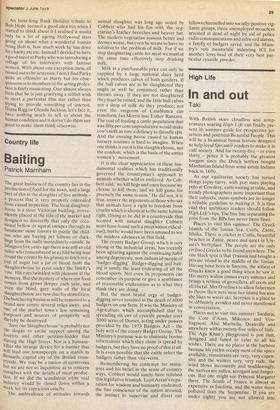Country life
Baiting
Patrick Marnham
The great business of the country lies in the Production of food for the town, and a large Part of this in the slaughter of live animals — a process that is very properly concealed from casual inspection. The local slaughterhouse is a stout Victorian building, conveniently placed at the side of the market and designed so discreetly that only the occasional bellow or squeal escapes through its handsome stone louvres to puzzle the children who are buying pet kittens or ducklings from the stalls immediately outside. In Islington five years ago there was still an old tailor who remembered as a child being sent round the corner by his granny to fetch not a cup of sugar but a jar of blood from the Slaughterhouse to pour under the family's vine. His eyes twinkled with pleasure at the memory. But the mystery of where our food comes from grows deeper each year, and even the blind, grey walls of the local Slaughterhouse are now due for demolition. Thebutchering business will be removed to a brand new centre several miles away, and One of the market town's few remaining Purposes and sources of prosperity will thereby be destroyed.
'Save our Slaughterhouse' is probably not the slogan to excite support among the tourists and other petition-fodder that throng the High Street. Nor is a humanekiller the strange device for a banner that Will lead our townspeople on a march to Brussels, capital city of the British countryside. We may be a nation of carnivores but we are not so inquisitive as to concern ourselves with the details of meat production, If we did the scandalous white veal industry would be closed down within a week for its capricious cruelty.
The ambivalence of attitudes towards animal slaughter was long ago noted by Cobbett who had his fun with the vegetarian's leather breeches and beaver hat. The modern vegetarian reasons better and dresses worse, but even he seems to have no solution to the problem of milk. For if we stop slaughtering cattle for meat we must at the same time effectively stop drinking milk.
Milk at a purchaseable price can only be supplied by a large national dairy herd which produces calves of both genders. If the bull calves are to be slaughtered they might as well be consumed rather than thrown away. If they are not slaughtered they must be raised, and the little bull calves not a drop of milk do they produce; not even the surgeons of Casablanca can transform Jan Morris into Esther Rantzen. The cost of feeding a cattle population that was fifty per cent unproductive would make cow's milk as rare a delicacy as throstle spit. And the ensuing havoc caused to human nursery routines is hard to imagine. When one thinks it out it is the slaughterhouse, not the condom, which is the basis of the entire women's movement.
It is the clear appreciation of these fundamental realities which has traditionally governed the countryman's approach to animals whether wild or enslaved. As Cobbett said, 'we kill hogs and oxen because we choose to kill them; and we kill game for precisely the same reason.' He did not, it is true, answer the arguments of those who say that animals have a right to freedom from cruelty which is identical to the same human right, (living as he did in a countryside that teemed with natural slaughter Cobbett must have found such a proposition ridiculous); but he would have been amused to see the modern advances in this field.
The county Badger Group, which is very strong in the industrial areas, has recently been agitating against the continuing habit among degenerate, non-industrial people of 'badger-digging'. Badger-digging and bait ing is surely the least endearing of all the blood sports. Not even its proponents can remember its purpose or give a semblance of reasonable explanation as to what they think they are doing.
But the most brutal orgy of badgerdigging never resulted in the death of 4000 badgers on one farm. It was the Ministry of Agriculture which accomplished that by spreading six cwt of cyanide powder over 3000 acres of Dorset, acting under powers provided by the 1973 Badgers Act — the holy writ of the county Badger Group. The Ministry's purpose was to eliminate bovine tuberculosis which they claim is spread by badgers, but they have no proof of this at all. It is even possible that the cattle infect the badgers rather than vice-versa.
Remembering his contempt for ministries and his belief in the sense of country ways, Cobbett would surely have relished this legislative triumph. Lord Arran's reputation for wisdom and humanity enshrined, the fine conscience of the nation aroused, the instinct to supervise and direct our fellows channelled into socially-positive vigilante groups, three unemployed mouchers arrested at dead of night by aid of police radio communications and infra-red alarms, a family of badgers saved, and the Ministry's vets meanwhile indenting ICI for another lorry-load of their very best particular cyanide powder.


































 Previous page
Previous page